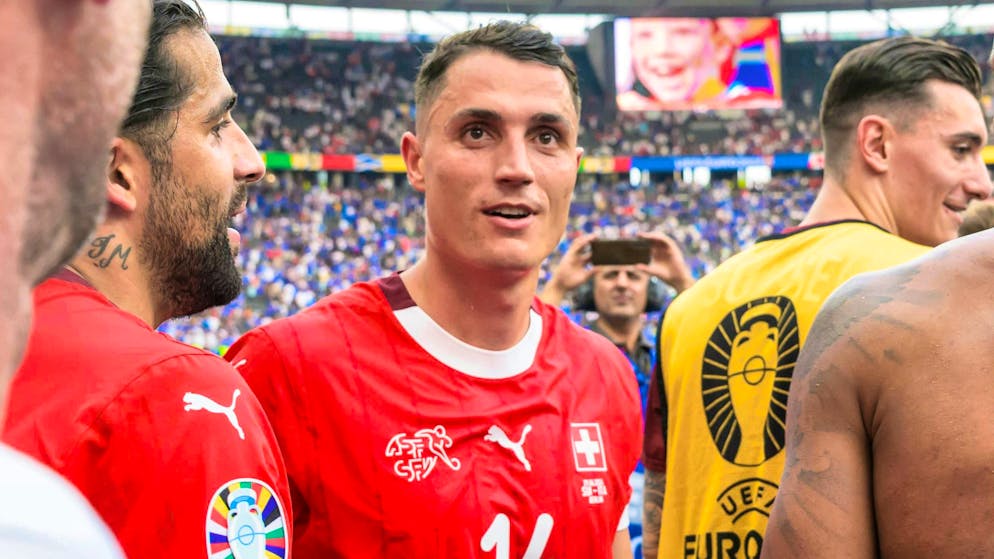When comparing the national team's performances last fall with those at the European Championships, it's hard to believe that it's the same team. What happened in between?
It was November 21 when the Swiss trotted off the pitch in Bucharest with stony faces. On the very pitch where, two years earlier, they had celebrated perhaps the most beautiful victory in the history of the association with their penalty shoot-out win against France in the round of 16 of the European Championship. The difference to the jubilant images from back then could hardly be greater: Now there was consternation. "It's very deep-seated, I don't know what to say," said Manuel Akanji, for example.
The 1-0 defeat against Romania was the low point of a weak qualifying campaign. In a group in which Switzerland were the clear favorites, they ended up with four wins (two against Andorra), five draws and one defeat. That was "not a great result", admitted national team director Pierluigi Tami. The fact that they still managed to secure their ticket to the European Championship as the worst runners-up was mainly due to their even weaker opponents.
And yet something already seemed to have happened. After months of not commenting on his relationship with Murat Yakin, captain Granit Xhaka demonstratively backed his coach after the defeat in the Romanian capital. "What can he do if we don't take our chances?" he asked the reporters. And when asked whether Switzerland would be going to the European Championship with Yakin, Xhaka replied: "I hope so."
The reappraisal factor
It remains to be seen how far the working through of the differences of opinion had already progressed. What is certain is that the coach and captain invested a lot of time after qualifying at the latest in order to find a common path. Xhaka was visited by Yakin in Germany several times, but according to Xhaka, "80 to 90 percent" of the talks were not about football.
Yakin had realized that he needed to involve his captain, who can carry the team with his strong personality but can also drag it down, more in his considerations. Or as Xhaka himself recently put it: "I am a person who brutally needs the trust and warmth of the coach. And that's now very, very, very good at Muri."
To get to this point, where coach and captain are in close contact and benefit from each other, both had to take a step back. Yakin, who had already repeatedly instigated power struggles as a player, as well as Xhaka, who likes to provoke in order to provoke reactions. The captain's coaching training may also have helped him develop new perspectives and sharpen his eye for the big picture.
Confirmation factor
In addition to the reconciliation of the alpha males, something else happened in the spring: Many national team players celebrated major successes with their clubs. In addition to the often-mentioned axis of champions around Yann Sommer (Inter), Manuel Akanji (Manchester City) and Granit Xhaka (Leverkusen), many other Swiss players also received important confirmation from their clubs in Europe's top leagues.
For example, the Bologna trio of Remo Freuler, Michel Aebischer and Dan Ndoye, who are now also performing at the European Championships. But also Fabian Schär, who had a strong season with Newcastle and is now finally delivering the performances in the national team that he regularly shows at club level. In addition, several Swiss players wear the captain's armband at their clubs and thus take on an important role.

The players have been able to confidently carry the flow into the national team and transfer it to the players who have not been able to celebrate as much success at their clubs. No matter which player you ask, they all emphasize the exceptionally good atmosphere in the team. The intensity of training, which was still criticized in the autumn, is also exceptionally high. Just as sometimes the appetite comes with eating, this team is driven by a new hunger for success.
The Contini factor
Following the departure of Vincent Cavin at the end of last year, a new man was appointed to Yakin's side in February: Giorgio Contini, like Yakin born in 1974 and a former companion. Thirteen years ago, the pair worked at FC Luzern as "young, freshly qualified coaches with lots of ideas in their heads" (Contini) and immediately led the team to second place. Even though they then parted ways, a special chemistry quickly developed between them again.
The breath of fresh air that Contini brought to the team was already clearly noticeable at the first meeting of the year in La Manga, Spain. With his multilingualism and enthusiasm, he is able to inspire all the players. Silvan Widmer enthused: "He has a great connection with us players and is a great motivator. I didn't know him before, but now I'm very happy that he's with us."
Yakin also emphasized: "Giorgio is a stroke of luck for us." When the position became vacant, he quickly thought of him. However, Yakin feared that Contini might not be interested in working as an assistant after his various stints as head coach. "But I don't see him as an assistant. He is what a teammate used to be for me, a fellow coach, so to speak." Meeting as equals is important for both sides, and the exchange has sometimes led to the bold decisions that have had resounding success at the European Championships so far.








